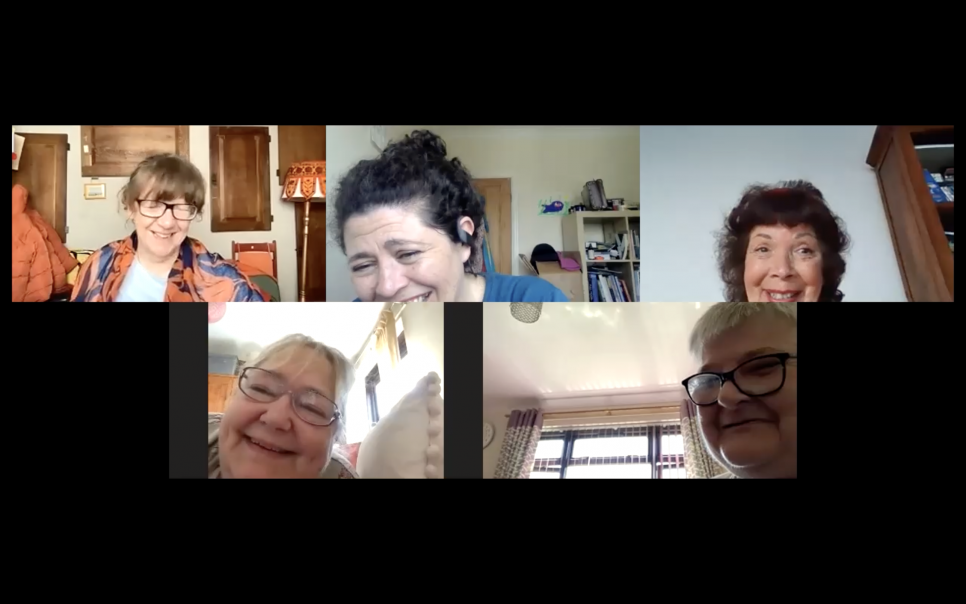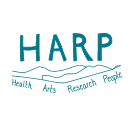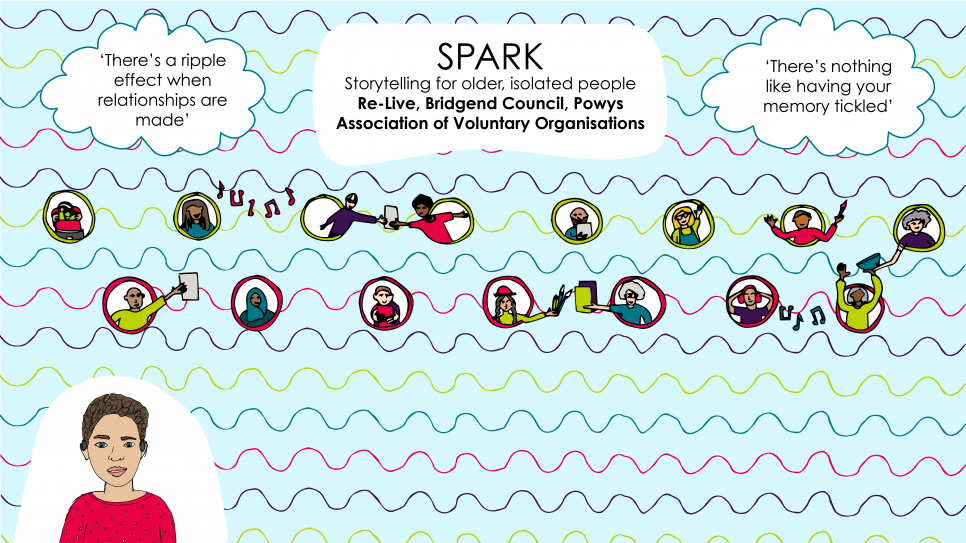Karin Diamond, SPARK project lead and Artistic Director of Re-Live, reflects on the experience of running a Life Story project for older adults online during a pandemic…
The pandemic had a drastic impact on the wellbeing of older adults in our communities.
Up to one-third of our older population reported feeling anxious and unsafe outside their home.
So, in April 2021, we launched the SPARK (Social Participatory Arts Research & Knowledge) project, a partnership between Re-Live, Bridgend County Council, and Powys Association of Voluntary Organisations.
The HARP-supported project connected older adults experiencing isolation and loneliness to a new creative community online. We worked alongside people living with complex mental health conditions, dementia and addiction.

The art of conversation
SPARK invites participants to share stories from their life and listen to other people share their stories. In our first session, for example, we invited people to share something about their name – whether it’s why they were given it, what it means, if they have a nickname or if they even like their name.
Simple conversation starters sparked connections that deepened over the 10 weeks as the group explored lived experiences through drama, music, song, and dance. Sharing a range of creative tools allowed flexibility and choice in how participants wanted to share their life stories and communicate their feelings, needs and ideas.
One of our SPARK groups collectively wanted to continue to meet beyond the 10-week project, so we extended the group for a further 10 weeks. The deeper level of trust allowed participants the time and space to explore challenging and unresolved experiences.
The impact on participants was very positive. Early research findings suggest that SPARK reduces isolation and loneliness for older adults and increases wellbeing and confidence through a shared group experience.
A reliance on SPARK is not our aim. We believe SPARK can be a first step towards a greater sense of agency and social connection for isolated older adults.
One participant with learning disabilities, who rarely left the house and was living with chronic depression, insisted they had nothing to contribute at the start of the project. After 10 SPARK sessions she shared her love of Elvis and was planning a trip to the Elvis convention in Porthcawl.
SPARK reduces isolation and loneliness for older adults and increases wellbeing and confidence
Breaking down barriers
Hosting the sessions online during a pandemic did present challenges.
Getting online was difficult for some participants, particularly those without in-person support. I was able to support one person living with dementia to connect to Zoom before each session. He described the sessions as a “lifeline”.
Each session was facilitated by two Re-Live practitioners to ensure safe and ethical practice. If a participant needed a quiet word, then a facilitator would be able to invite the participant into a breakout room to talk – the online equivalent of going for a walk or sitting outside – while the other practitioner continued the session.
Community connectors, who help adults access community-level services and activities, proved crucial to many people accessing the group. They helped with technological issues and bolstered people’s confidence to engage in a Zoom call.
One participant stopped attending the group when her support worker was unable to continue helping her get online, due to the huge demand on the support worker’s time. This situation was hard for both participant and support worker; as they had developed a routine of sitting together after each SPARK session to reflect on the experience, which was building trust and connection between them.
Community support services will play a key part in any future SPARK project. When the support is there, it can build confidence for participants to connect - without it, some people who are feeling isolated are unlikely to feel confident to join us.
Building research evidence for SPARK
As part of our HARP project we are conducting research that aims to investigate whether the SPARK intervention is helping reduce loneliness and social isolation in its older adult participants. It considers how, why, for who and to what extent it works so that learning can be translated across Wales.
With HARP’s support, and in partnership with the University of South Wales, we have created a research opportunity for an MRes student who has worked closely with Re-Live throughout the project.
The researcher is conducting a realist theory review of our work, combining observation, feedback and quantitative data to generate insights into what happens during sessions. They are building a logic model for SPARK that we can use to design future research.
Future-proofing arts and health for the most vulnerable
Due to the positive impact the project has had on participants’ health and wellbeing, our vision is for SPARK to become a social prescribing intervention that is available across Wales.
Several things need to be in place for that to be possible.
Firstly, SPARK has highlighted the need for a best practice framework for working creatively with vulnerable groups, both for creative practitioners, social prescribers, and community connectors.
Secondly, building the evidence base for future larger applications for the expansion of our work is vital.
We would like to secure the resource and time for our evaluator to research a larger sample of participants to better determine the return on investment and demonstrate the longer-term impact this work has on people’s lives.
It is important we continue to design and deliver non-pharmacological approaches to support the health and wellbeing of older adults in Wales. We’ve witnessed the transformational impact the arts can have on people experiencing isolation and loneliness. Long-term funding for arts and health interventions is essential for our nation’s health and wellbeing, and vital in reducing the burden on our NHS and social care systems.
SPARK is a partnership between Re-Live, Bridgend County Council, and Powys Association of Voluntary Organisations.
For more information visit/contact www.re-live.org.uk
Simple conversation starters sparked connections that deepened over the 10 weeks

